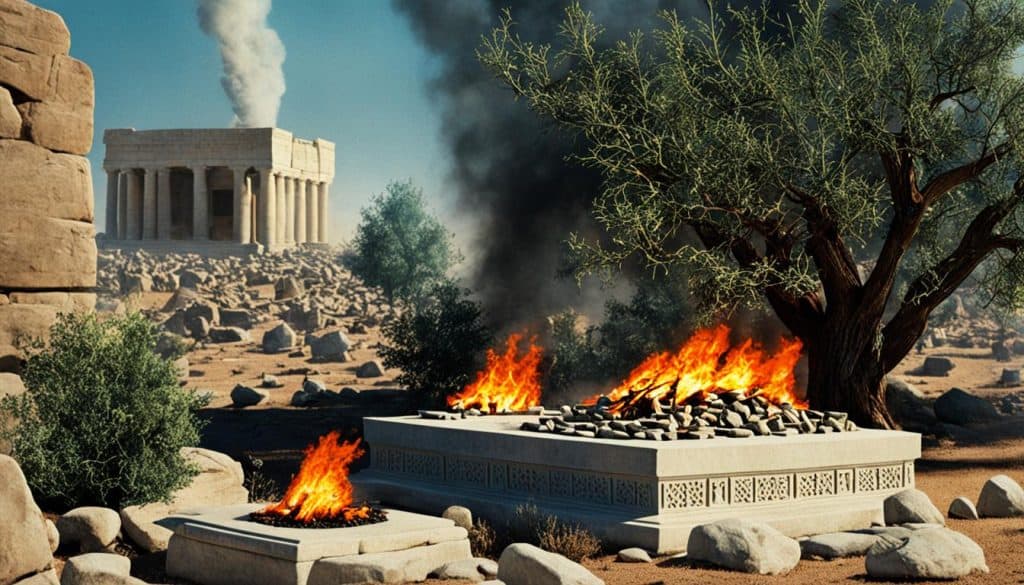Consecration Bible Quotes Generator Tool
Use this tool to explore insights about consecration in the Bible, understand its meaning, and learn about biblical examples of consecration through affirmations, quotes, and fascinating facts. Click the buttons below to uncover the significance of consecration, the stories of individuals dedicating themselves to God, and what the Bible says about living a life set apart for Him.
Are you curious about the concept of consecration in the Bible?
Do you want to understand more about the different acts of faith and worship that are described as examples of consecration in the Bible?
This informative article will take you through ten examples from the scriptures that illustrate the idea of consecration and the dedication of oneself to God.
From the consecration of the temple by Solomon to the consecration of the Christian believer, this blog post explain each example in detail.
Read on to learn about these examples of consecration in the Bible and deepen your understanding of this important spiritual practice.
Make Sure You Watch My Video: I would love for you to subscribe to my YouTube channel as well…
The Consecration of Aaron and His Sons (Exodus 29; Leviticus 8)
According to the Bible, Aaron and his sons were consecrated as priests of the Lord through a specific ritual as described in Exodus 29 and Leviticus 8. The consecration process included several steps that were essential for the priests to be considered holy and set apart for God’s service.
The first step was the selection of Aaron and his sons as priests, which was done by God himself. Then, Aaron and his sons had to be washed with water and clothed in the priestly garments, which included a breastplate, a robe, and a turban.
After that, an offering of a bull was made, and the blood was sprinkled on the altar and Aaron and his sons.
The next step was the anointing of Aaron and his sons with oil, which symbolized the Holy Spirit’s presence. The oil was poured over Aaron’s head, and then it was poured over his sons’ heads, who were present with him.
Finally, a seven-day ceremony was held, during which Aaron and his sons remained inside the tabernacle. Each day, a specific sacrifice was made, and the priests were instructed on how to perform their duties.

By the end of the seven days, Aaron and his sons were fully consecrated and ready to perform their duties as priests of the Lord.
The Dedication of the Temple by Solomon
Solomon, the son of David, built the temple in Jerusalem as a place where God’s name would dwell forever. After the temple’s construction, Solomon gathered the leaders of Israel to dedicate it to God, as described in 1 Kings 8 and 2 Chronicles 5-7.
To consecrate the temple, Solomon and the people of Israel offered many sacrifices, including cattle and sheep. The temple was filled with the ark of the covenant, the priests, and the Levites who ministered in the holy place.
Solomon then led the people in a prayer of dedication, acknowledging God’s faithfulness to Israel and asking for His continued presence in the temple.

Now, my God, may Your eyes be open and Your ears attentive to the prayers offered in this place.” – Solomon (2 Chronicles 6:40)
Finally, a great feast was held, lasting seven days, with people from all over Israel and even beyond its borders. The dedication of the temple by Solomon was a grand occasion, marking a significant moment in Israel’s history and establishing the temple as a place of worship for generations to come.
Samuel’s Consecration to the Lord (1 Samuel 1:11, 24-28)
Hannah, a woman who could not bear children, prayed earnestly to the Lord for a son, dedicating him to serve the Lord all the days of his life. God granted her request, and she named her son Samuel, which means “heard by God”.
After Samuel was weaned, Hannah brought him to the temple along with offerings for sacrifice and presented him to Eli, the priest, to serve in the tabernacle.
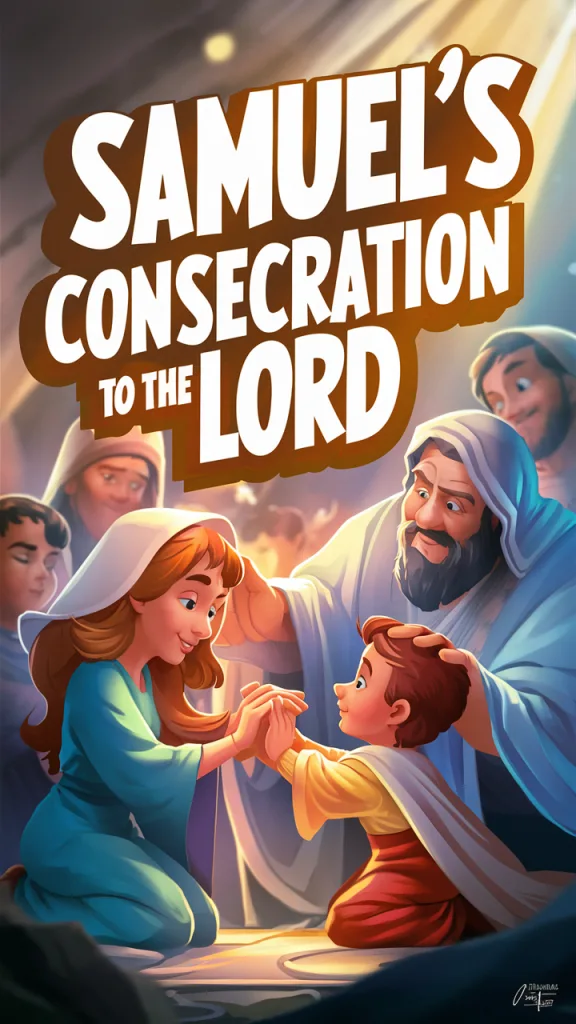
Hannah’s act of consecrating Samuel to the Lord from birth demonstrated her recognition of God’s sovereignty and her commitment to His will. Samuel grew up to become a great prophet and judge in Israel, leading the nation through tumultuous times and anointing its first two kings, Saul and David.
“For this child I prayed, and the Lord has granted me my petition that I made to him. Therefore I have lent him to the Lord. As long as he lives, he is lent to the Lord.”
In dedicating Samuel to the Lord’s service, Hannah removed her own personal desires and placed God’s plan and purpose above everything else. Her act of faith and devotion serves as an example for all believers to consecrate themselves to God and trust in His providence.
Jesus’ Consecration in the Temple (Luke 2:22-24)
According to Jewish law, Mary and Joseph bring baby Jesus to the temple in Jerusalem to consecrate him to the Lord. This act of faith and devotion reveals their commitment to God and highlights the importance of religious ritual in Jewish culture.
The consecration ceremony involves presenting Jesus to the priest and offering sacrifices, according to the Law of Moses. It is a significant event in Jesus’ early life and emphasizes the fulfillment of Old Testament prophecy surrounding the coming of the Messiah.
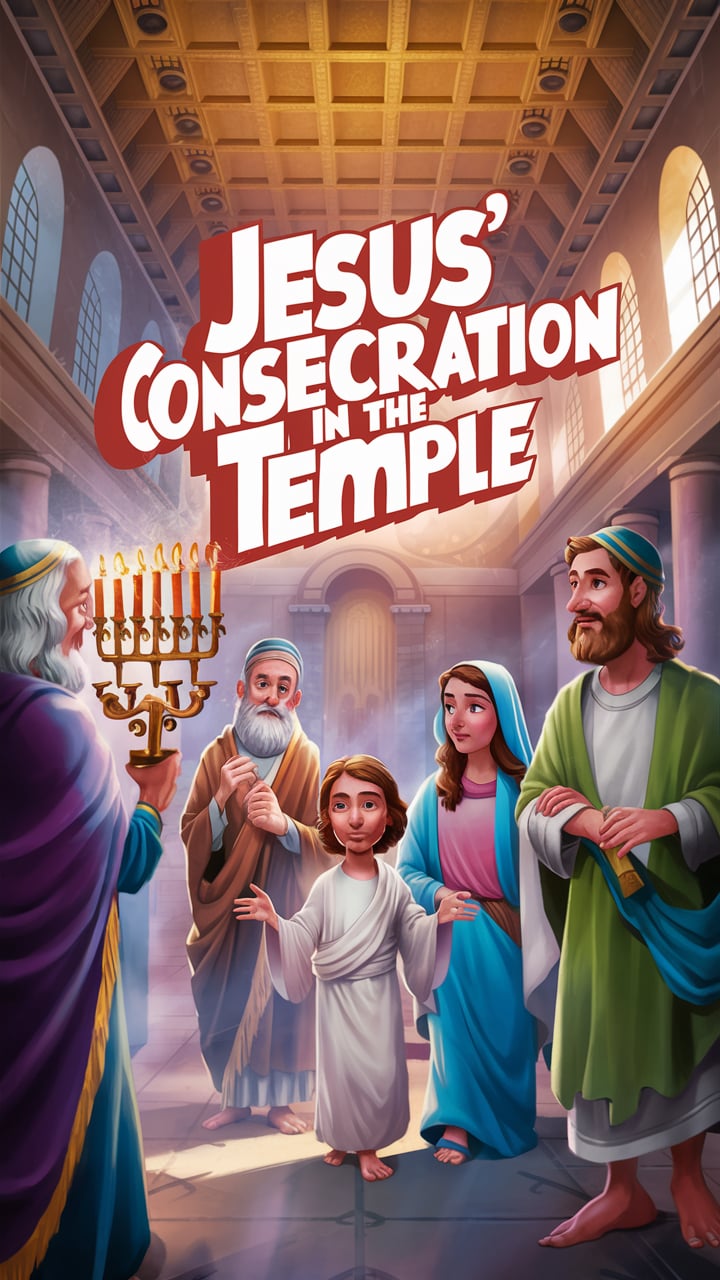
“When the time came for the purification rites required by the Law of Moses, Joseph and Mary took him to Jerusalem to present him to the Lord (as it is written in the Law of the Lord, ‘Every firstborn male is to be consecrated to the Lord’).” (Luke 2:22-23)
The consecration of Jesus in the temple underscores the importance of dedicating oneself to God and following religious customs. It sets the stage for Jesus’ later ministry and highlights his divine mission to save humanity.
The Nazirite Vow
The Nazirite vow, found in Numbers 6:1-21, is a symbolic act of consecration to the Lord. By taking this vow, individuals set themselves apart for a period of time to devote themselves entirely to God.
One of the requirements is to abstain from alcohol, as well as avoiding contact with dead bodies. Another significant aspect of the Nazirite vow is not cutting one’s hair, symbolizing the length of time spent in the vow.
This vow was taken by notable figures in the Bible such as Samson and Samuel. Through their vow, they embodied a deep commitment to serving God, allowing them to fulfill a unique purpose in their time.

The Nazirite vow may seem extreme, but it serves as an expression of devotion and dedication to God. It teaches us the importance of setting aside time and space to honor God completely, allowing Him to work in and through us in powerful ways.
By consecrating ourselves to the Lord, we open ourselves up to receive His blessings and guidance.
The Consecration of the Levites (Numbers 8:5-22)
In Numbers 8:5-22, God instructs Moses to consecrate the Levites, a tribe of Israel that would serve in the tabernacle and assist the priests. The ceremony involved purification with water, a sin offering, and the laying on of hands:
“Take the Levites from among the other Israelites and make them ceremonially clean. To purify them, do this: Sprinkle the water of purification on them; then have them shave their whole bodies and wash their clothes. Finally, they will be ceremonially clean… After that, let the Levites come forward… Put your hands on them and present them to the Lord as a wave offering, so that they may carry out the work of the Lord.”
The Levites were set apart for a special purpose, and their consecration was an important ritual that recognized their role in serving God. The laying on of hands symbolized the transfer of authority and responsibility, as well as the blessings of the priesthood.

The Role of the Levites
The Levites were responsible for a variety of tasks related to the tabernacle, including setting it up and taking it down, transporting it during travel, and guarding it.
They also assisted the priests with sacrifices and other duties. Unlike the priests, who were limited to descendants of Aaron, the Levites could come from any tribe of Israel.
The Significance of Consecration
Consecration was a key element in Israelite worship, marking individuals or objects as holy and set apart for God’s purposes.
It involved a solemn dedication of oneself or one’s possessions to God, often accompanied by sacrifices and purification rituals. Consecration was a way of acknowledging that everything belongs to God and that one’s life should be lived in service to Him.
The Fast and Consecration at Mizpah
According to 1 Samuel 7:5-6, the Israelites gathered at Mizpah and fasted, confessing their sins and dedicating themselves to the Lord.
Samuel, the prophet and judge, led them in this act of consecration, seeking the Lord’s favor and protection against their enemies, the Philistines.
The fast was a time of self-denial and repentance, demonstrating a sincere desire to turn away from wrongdoing and return to God. The act of consecration itself involved setting themselves apart for God’s purposes, offering themselves as living sacrifices.
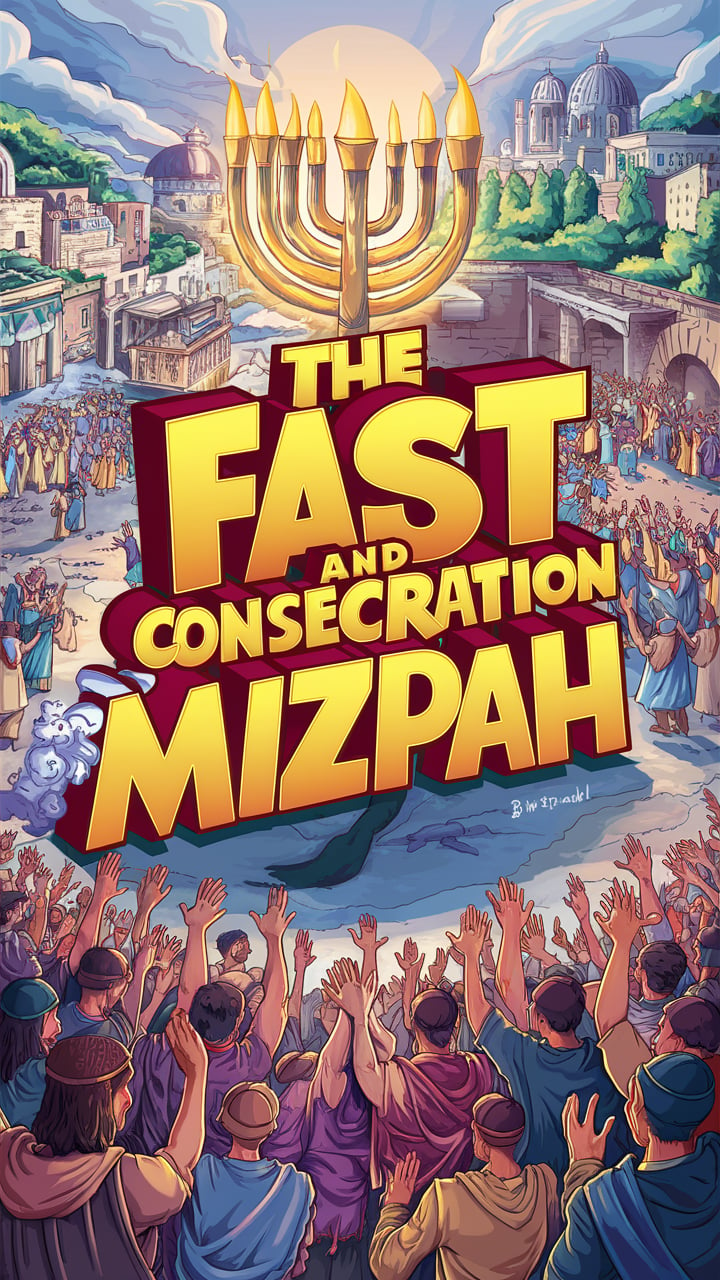
You are invited to follow in the footsteps of the Israelites and seek God’s face by fasting and consecration today.
The Consecration of the Firstborn (Exodus 13:2, 12-15)
In Exodus 13:2, God commands the Israelites to consecrate every firstborn male, whether human or animal, to Him. The ritual involves redeeming the firstborn son with a sacrifice, either with a lamb or by substituting a donkey or another animal.
The consecration of the firstborn serves as a remembrance of the deliverance of the Israelites from Egypt, where the firstborn of the Egyptians died, while the Israelites were spared from the plague.
The consecration of the firstborn is a symbolic representation of the Israelite’s obedience and faithfulness to God, acknowledging His sovereignty over their lives and possessions.
It is a reminder of God’s protection and provision for His people, and a call to honor Him with their first fruits.

The consecration of the firstborn also points to Jesus Christ as the firstborn of God, who was consecrated to the Father for the redemption of humanity. As Hebrews 12:23 states, He is “the firstborn among many brothers and sisters.”
Consecration of the Christian Believer (Romans 12:1-2)
As a Christian, your consecration to God entails presenting your body as a living sacrifice, holy and pleasing to Him. Doing this is not just a one-time event, but a constant sacrifice that requires a selfless attitude and unwavering faith.
Paul, in his letter to the Romans, states that you should not conform to the patterns of this world but be transformed by renewing your mind, so that you may discern God’s will.

“Therefore, I urge you, brothers and sisters, in view of God’s mercy, to offer your bodies as a living sacrifice, holy and pleasing to God—this is your true and proper worship. Do not conform to the pattern of this world, but be transformed by the renewing of your mind. Then you will be able to test and approve what God’s will is—his good, pleasing and perfect will.
You consecrate yourself to God by living a life that honors Him in everything you do. This involves following His commandments, striving for purity, and displaying Christ-like love to everyone you meet. By doing so, you bring glory to God and inspire those around you to also consecrate themselves to Him.

Remember, your consecration to God is not only a way of life but also a spiritual act of worship. So, continue to offer Him your living sacrifice, sacrificing your own desires for His will, and trust that He will guide your steps as you seek to live for Him.
Can Biblical Consecration Lead to True Worship?
Biblical consecration is the key to becoming true worshippers in the Bible. When we fully dedicate ourselves to God, we can experience true worship that comes from the depth of our hearts. Consecration leads us to a relationship with God that transforms our lives and allows us to worship Him in spirit and truth.

Consecration of the Church at Antioch (Acts 13:2-3)
If you want to learn more about a powerful act of spiritual dedication, explore the consecration of the church at Antioch. In Acts 13:2-3, the church leaders gather together to fast and pray, seeking guidance from the Holy Spirit about whom to send on a missionary journey.
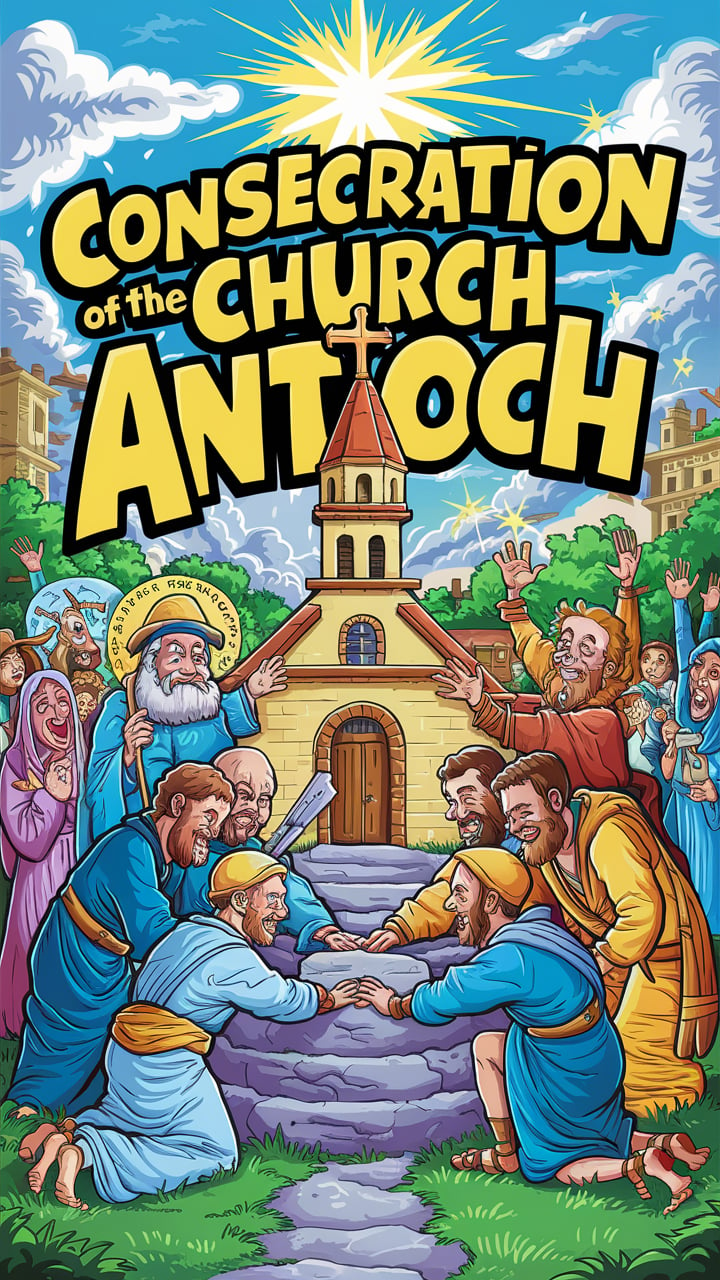
Through this act of consecration, the church leaders show their commitment to following God’s will and spreading the gospel to new regions. As a result, Barnabas and Saul (later known as Paul) are chosen and sent out on a journey that leads to the foundation of churches throughout the Mediterranean world.
This example demonstrates the importance of seeking God’s guidance through prayer and fasting, especially when faced with important decisions. It also highlights the power of consecration to strengthen one’s faith and commitment to serving God’s purposes.
Call to Action: The Question That Demands an AnswerIn Acts 2:37 Peter and the Apostles were asked the question – What Shall We do? And in Acts 2:38 Peter answered, Repent, and be baptized every one of you in the name of Jesus Christ for the remission of sins, and ye shall receive the gift of the Holy Ghost. For the promise is unto you, and to your children, and to all that are afar off, even as many as the Lord our God shall call. Do you understand this? After hearing the gospel and believing, they asked what should would do. The answer hasn’t changed friend, Peter clearly gave the answer. The question for you today is, Have you receieved the Holy Spirit Since you believed? If you’re ready to take that step, or you want to learn more about what it means to be born again of water and Spirit, visit: Come, and let the Spirit make you new. |

